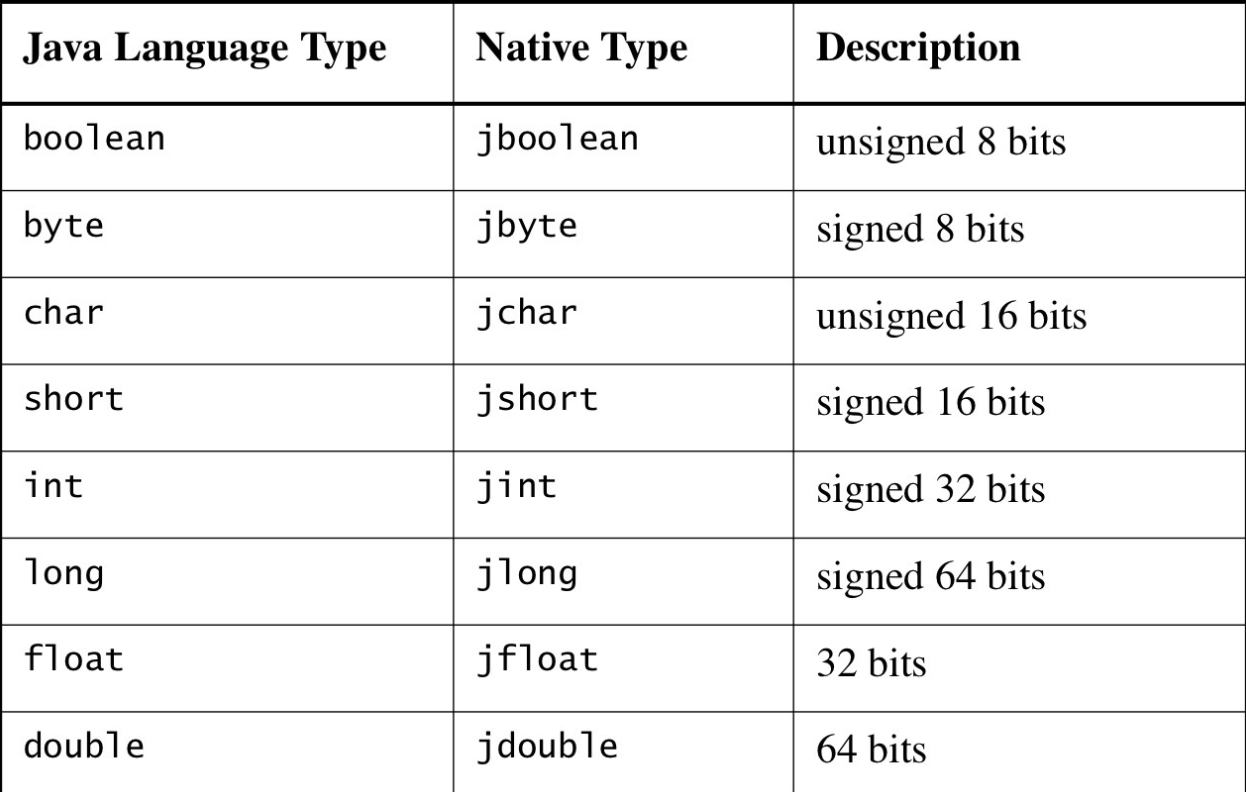基本数据类型

1
2
3
4
5
6
7
8
9
10
11
12
|
#ifndef JNI_TYPES_ALREADY_DEFINED_IN_JNI_MD_H
typedef unsigned char jboolean;
typedef unsigned short jchar;
typedef short jshort;
typedef float jfloat;
typedef double jdouble;
typedef jint jsize;
|
接下来,我们找到找到jnt_md.h中的数据定义。 jni_md.h 包含了针对 jbyte、jint 和 jlong 的机器相关的类型定义。
1
2
3
4
5
6
7
8
9
10
11
12
13
14
15
16
|
#ifdef TARGET_ARCH_x86
# include "jni_x86.h"
#endif
#ifdef TARGET_ARCH_sparc
# include "jni_sparc.h"
#endif
#ifdef TARGET_ARCH_zero
# include "jni_zero.h"
#endif
#ifdef TARGET_ARCH_arm
# include "jni_arm.h"
#endif
#ifdef TARGET_ARCH_ppc
# include "jni_ppc.h"
#endif
|
那我们继续查看jint_x86.h:
1
2
3
4
5
6
7
8
|
typedef int jint;
#if defined(_LP64)
typedef long jlong;
#else
typedef long long jlong;
#endif
typedef signed char jbyte;
|
引用数据类型
下面是一些引用数据类型,使用typedef定义别名。

1
2
3
4
5
6
7
8
9
10
11
12
13
14
15
16
17
18
19
20
21
22
23
24
25
26
27
28
29
30
31
| #ifdef __cplusplus
class _jobject {};
class _jclass : public _jobject {};
class _jthrowable : public _jobject {};
class _jstring : public _jobject {};
class _jarray : public _jobject {};
class _jbooleanArray : public _jarray {};
class _jbyteArray : public _jarray {};
class _jcharArray : public _jarray {};
class _jshortArray : public _jarray {};
class _jintArray : public _jarray {};
class _jlongArray : public _jarray {};
class _jfloatArray : public _jarray {};
class _jdoubleArray : public _jarray {};
class _jobjectArray : public _jarray {};
typedef _jobject *jobject;
typedef _jclass *jclass;
typedef _jthrowable *jthrowable;
typedef _jstring *jstring;
typedef _jarray *jarray;
typedef _jbooleanArray *jbooleanArray;
typedef _jbyteArray *jbyteArray;
typedef _jcharArray *jcharArray;
typedef _jshortArray *jshortArray;
typedef _jintArray *jintArray;
typedef _jlongArray *jlongArray;
typedef _jfloatArray *jfloatArray;
typedef _jdoubleArray *jdoubleArray;
typedef _jobjectArray *jobjectArray;
|
弱引用类型
参考链接:https://juejin.cn/post/6934309297815977992
方法签名时用到的公共体类型jvalue
jvalue是一个unio(联合)类型。在C语中为了节约内存,会用联合类型变量来存储声明在联合体中的随意类型数据 。在JNI中将基本数据类型与引用类型定义在一个联合类型中,表示用jvalue定义的变量,能够存储随意JNI类型的数据。原型以下:
1
2
3
4
5
6
7
8
9
10
11
| typedef union jvalue {
jboolean z;
jbyte b;
jchar c;
jshort s;
jint i;
jlong j;
jfloat f;
jdouble d;
jobject l;
} jvalue;
|
jfieldID和jMethodID
1
2
3
4
5
| struct _jfieldID;
typedef struct _jfieldID *jfieldID;
struct _jmethodID;
typedef struct _jmethodID *jmethodID;
|
四种不同引用类型的定义
1
2
3
4
5
6
7
|
typedef enum _jobjectType {
JNIInvalidRefType = 0,
JNILocalRefType = 1,
JNIGlobalRefType = 2,
JNIWeakGlobalRefType = 3
} jobjectRefType;
|
布尔值
1
2
3
4
5
6
|
#define JNI_FALSE 0
#define JNI_TRUE 1
|
JNI函数的返回值
1
2
3
4
5
6
7
8
9
10
11
|
#define JNI_OK 0
#define JNI_ERR (-1)
#define JNI_EDETACHED (-2)
#define JNI_EVERSION (-3)
#define JNI_ENOMEM (-4)
#define JNI_EEXIST (-5)
#define JNI_EINVAL (-6)
|
其他常量
1
2
3
4
5
6
|
#define JNI_COMMIT 1
#define JNI_ABORT 2
|
JNI Native Method
1
2
3
4
5
| typedef struct {
char *name;
char *signature;
void *fnPtr;
} JNINativeMethod;
|
JNI_ENV变量
1
2
3
4
5
6
7
8
9
10
11
12
13
14
15
16
17
18
19
20
21
22
23
24
25
|
struct JNINativeInterface_;
struct JNIEnv_;
#ifdef __cplusplus
typedef JNIEnv_ JNIEnv;
struct JNINativeInterface_{
........
........
}
struct JNIEnv_ {
const struct JNINativeInterface_ *functions;
#ifdef __cplusplus
jint GetVersion() {
return functions->GetVersion(this);
}
|
JavaVM变量
1
2
3
4
5
6
7
8
9
10
11
12
13
14
15
16
17
18
19
20
21
22
23
24
25
26
27
28
29
30
31
32
33
34
35
36
37
38
39
40
41
42
43
44
45
46
47
48
49
|
struct JNIInvokeInterface_;
struct JavaVM_;
#ifdef __cplusplus
typedef JavaVM_ JavaVM;
struct JNIInvokeInterface_ {
void *reserved0;
void *reserved1;
void *reserved2;
jint (JNICALL *DestroyJavaVM)(JavaVM *vm);
jint (JNICALL *AttachCurrentThread)(JavaVM *vm, void **penv, void *args);
jint (JNICALL *DetachCurrentThread)(JavaVM *vm);
jint (JNICALL *GetEnv)(JavaVM *vm, void **penv, jint version);
jint (JNICALL *AttachCurrentThreadAsDaemon)(JavaVM *vm, void **penv, void *args);
};
struct JavaVM_ {
const struct JNIInvokeInterface_ *functions;
#ifdef __cplusplus
jint DestroyJavaVM() {
return functions->DestroyJavaVM(this);
}
jint AttachCurrentThread(void **penv, void *args) {
return functions->AttachCurrentThread(this, penv, args);
}
jint DetachCurrentThread() {
return functions->DetachCurrentThread(this);
}
jint GetEnv(void **penv, jint version) {
return functions->GetEnv(this, penv, version);
}
jint AttachCurrentThreadAsDaemon(void **penv, void *args) {
return functions->AttachCurrentThreadAsDaemon(this, penv, args);
}
#endif
};
|
其余的
1
2
3
4
5
6
7
8
9
10
11
12
13
14
15
16
17
18
19
20
21
22
23
24
25
26
27
28
29
30
31
32
| #ifdef _JNI_IMPLEMENTATION_
#define _JNI_IMPORT_OR_EXPORT_ JNIEXPORT
#else
#define _JNI_IMPORT_OR_EXPORT_ JNIIMPORT
#endif
_JNI_IMPORT_OR_EXPORT_ jint JNICALL
JNI_GetDefaultJavaVMInitArgs(void *args);
_JNI_IMPORT_OR_EXPORT_ jint JNICALL
JNI_CreateJavaVM(JavaVM **pvm, void **penv, void *args);
_JNI_IMPORT_OR_EXPORT_ jint JNICALL
JNI_GetCreatedJavaVMs(JavaVM **, jsize, jsize *);
JNIEXPORT jint JNICALL
JNI_OnLoad(JavaVM *vm, void *reserved);
JNIEXPORT void JNICALL
JNI_OnUnload(JavaVM *vm, void *reserved);
#define JNI_VERSION_1_1 0x00010001
#define JNI_VERSION_1_2 0x00010002
#define JNI_VERSION_1_4 0x00010004
#define JNI_VERSION_1_6 0x00010006
#define JNI_VERSION_1_8 0x00010008
#ifdef __cplusplus
}
#endif
#endif
|
参考
https://blog.csdn.net/qq_36653924/article/details/124470927
https://www.jianshu.com/p/27eaa6669009
https://www.cnblogs.com/cynchanpin/p/7136178.html










